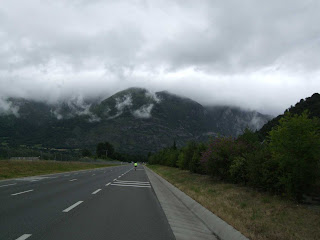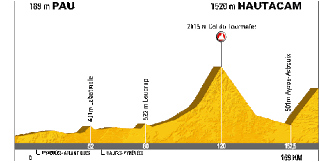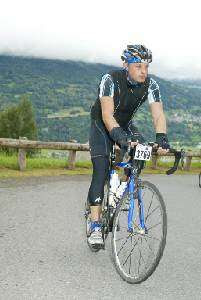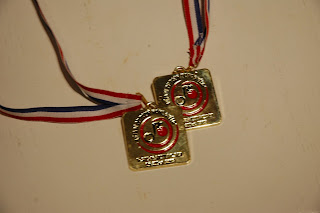Apologies to readers who are short on time as this part of the blog is lengthy. It documents not only what we did, but our impressions and feelings of the situations.
On our way – how we got there
Our year of preparations culminated all too quickly on Wednesday at the airport check -in. With about 20kg of overweight luggage between the three of us, Jerard was pleased to again have the lightest bike/case combo, speccing carbon/ceramic casters and extra lightweight buckles for his “box from the net“ Sadly, Mark was overweight by nearly 9kgs – most of which chocolate for his insane metabolism. We had all been cautioned by our wives to dress warmly and to some extent had packed some optional extra clothing. My non-bike clothing was curtailed to a spare shirt and undergarments due to the potential of $Singapore 80/kg charges for overweight luggage. Perhaps we’d be able to justify a set of Lightweight carbon wheels to get under the SIA limit of 20kgs?
After a short check-in thanks to the on-line check-in facilities, followed by the now familiar passage past the security goons, we were on board en-route to Singapore. One of the advantages of travelling with two other bike riders is that you can take up a whole row of seats and not sit next to someone who is using up more than their share of seating! A pleasant flight to Singapore and a two hour transit saw us on our way to Barcelona via Milan. Once overseas, it doesn’t take long to realise that sometimes we do live in Hicksville. The scale and clockwork efficiency of Singapore airport, even in the middle of the night, has no compare.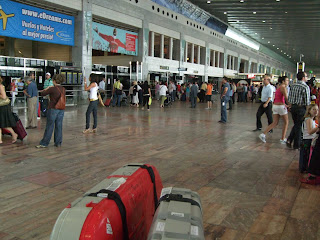
Once into the airport terminal in Barcelona, nothing could have prepared us for the chaos and activity of a Latin country. The passport queue was hideous, then we unhappily collected our mildly damaged luggage (somehow some casters had been bent). The customs officers gave us a nod to go past (none of the officials had spoken a single word to us through immigration) and it was welcome to Spain! Outside, the airport was a hive of activity, with eight lanes of cars, taxis, busses and motor scooters noisily competing for road space and our attention. It had begun to rain a bit which was not good for our morale, with tensions already at a nervous high in view of what lay ahead. Where was the famed Mediterranean hot weather? We must have imported some winter from Perth.
After a short transfer where we amazed the bus driver with the unlikely act of cramming 3 bike cases into the boot of a minibus, we were at our hotel – surprisingly up-market, in a commercial area near the airport. The bikes came out and the process of spannering them back to completeness began. They had survived unscathed. As I was tightening up my seat post collar the Crapagnolo threads stripped, and the bolt was not going to be long enough to engage the rest of the threads. Bugger – where are we going to get a 32.4mm collar in Barcelona (they are hard enough to come by on various online sites)? We had planned to go into town for lunch anyway in order to resist the temptation to sleep, and now had a real purpose.
After a few enquiries at Decathlon (a Rebel Sport like chain store), we were directed to perhaps the BEST bike shop I have been to in the WORLD! Pro Bike (www.ProBike.es – not the same as a well known on-line retailer) has over three levels of mainly off road bikes. Base to high-end are catered for with drool worthy parts, wheels, clothing and bikes actually in stock and on display. Prices also were surprisingly reasonable. How about a built Cannondale System 6 in Liquigas colours for 1900 Euros? Perhaps the most distinctive feature of the shop is that the servicing is on the top floor, with the mechanics testing out their rides by pedalling them down the series of ramps to the ground floor, then back up again. MTB customers can even test their bikes out back on a short trial course. Everyone actually seemed happy to work there. I explained my problem to one of the mechanics, who emerged later unable to find a suitable replacement collar, but came up instead with a longer bolt. He surprised me by saying there was no charge. We were more than happy to buy our gels, and bars here, along with a spare tube and some socks that I would find useful later.
We returned to the hotel in the late afternoon. With few dining options, as dinner in Spain starts at 2000hrs, we went back to the airport on the free shuttle to get some baguettes. If anything it was more chaotic than ever. We were also beginning to notice that Spanish ladies were more noticeably up-front than in other countries. The number of tattoos on show was also striking, though it was not for us to argue against other cultural standards. We settled in for an uneasy night, yet looking forward to the challenges that were to come. As we were still a little time zone challenged, some of us were able to wake up to see if late night German TV had changed much from when we were in Europe last year. It’s good to see their society is as progressive as always…
Getting to Lourdes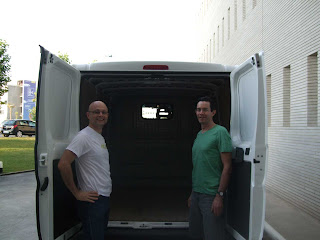
We woke up bright and early to go to the airport to pick up our hire car – a Fiat Ducato van more suited to moving house than bikes. The bikes and cases were swallowed up in the cargo area, and we soon commenced our road trip along the highway Northwest from Barcelona to the French border, crossing the Pyrenees. The country turned from flat and dry, to hilly, and soon we arrived at the foot of the mountains. Again we were filled with trepidation as we caught glimpses of the peaks up near the clouds. It’s pretty rare to have clouds at the top of Welshpool road, and most people who want to go that high take aeroplanes. As we drove around the hairpin roads, we were again thinking of how the Tour riders would show superhuman skills climbing and especially descending at speed. We had our own fears of descending the roads especially with the forecasted rain, not having forgotten our experience on Ventoux the year before. You cannot imagine how easily you can pick up speed down a hill, until you stop for lunch and find that the peppery smell is from your car’s brakes cooking from the descent.
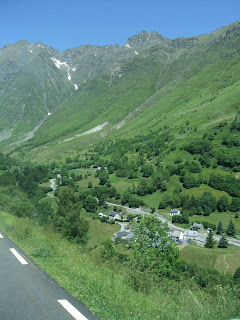
We got to Lourdes two hours later than we had hoped, just as the weather seemed to be coming in. Lourdes is an amazing place for pilgrims of many types – both religious and for the cycling in the area. The more common are those who seek healing from the Virgin Mary at the famed Grotto (it was the 150th anniversary of the appearance of the apparition meaning it was particularly busy). The masses of nuns, wheelchairs, and devout from all over the world is impressive. Somewhat depressive however is the tackyfication of what must have been a pretty French riverside village with endless trinket shops full of plastic icons. This extent of commercialism is a little affronting. There is blatant profiteering, as a can of drink that is 50cents in other parts of France, and for that matter in other parts of Lourdes, commands a 2Euro price down-town. The pilgrims of the bike alas have to share the town and conditions in order to access the many famous climbs of the area.
We battled through the endless swarm of devout, who truly must have faith in the healing waters, as they were unafraid of a simple thing such as being run over by three Aussies in a van. We later learned that this happens with any driver, even if you are driving a full tourist coach. Taxi drivers in this town must have a similar faith in the healing waters as they drive full tilt through the crowds. We finally found our hotel to meet up with the tour organisers outside who told us we had just 30 minutes to join in a ride. We looked at each other, and shrugged our shoulders as we rushed the cases to our rooms changed into our knicks.
The First Ride
The first ride with our Aussie cohort started a discussion between the three of us: can you tell a rider’s ability from their bike? I looked down at my own to conclude that cycling prowess does not correlate with you ability to press “add to cart”. What if you look athletic/strong – does it mean you ARE strong? Some people (particularly the guys leading the tour group) certainly looked strong. What if you look old or have a gut? We concluded ( incorrectly as it turns out) that if you look crap, you are likely a weak rider. This was to be disproved many times over the next two days by various 60 year old men and women effortlessly riding up their hills.
The ride took in a climb that would be a small prelude to the real climbs on the etape ride – a mere blip in the profile. This short test however filled me with confidence, as the roads were good and I had kept up (unlike my usual form in Perth). It felt good to stretch the legs, and the bike was performing well. The bike itself was never going to let me down, as it was a marvel of technology, the result of years of design and technology. No, it was not going to be the weakest link.
We got back to a rushed shower and dinner. Todd had arrived, but looked despondent. His bike had not made it on the same flight out of London. Things were looking grim for his etape. Lindy had her bike, but had not had a ride for some time since her tour of Italy. They had conned a friend Dave, also from Perth to join in this escapade.
The Day Before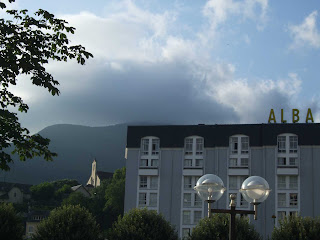
We woke up to a grey sky with massing clouds . If this had been a scene in “Lord of the Rings” it would have been a sign of impending Armageddon or suchlike. It evoked a similar ill feeling before the ride. Todd’s bike had arrived the night before from its side trip to Poland, and he was itching to ride. Mark, Jerard and I decided to take the soft option and sit out the day’s riding on the bus in the developing rain. The plan was for us to register in the town of Pau where a bike fair was set up at the starting village, and anyone who wanted to ride home could. We decided to use the day to procure clothing that would make our day more comfortable (less uncomfortable?) and safer in what we assumed would be horrendous conditions at the top of the peaks. Talking to various people from the area, we resigned ourselves to freezing conditions at the top.
Our lack of winter gloves essential to prevent our hands from numbing in the cold and allowing us to brake effectively when descending, was a weak link. There were none to be had at the fair since the organisers of the stalls mainly brought end of season stock and that season was summer. We caught the coach back which was piloted by a brave fellow called Marc (he fearlessly barrelled his coach through the ancient streets). Marc was a former cyclist and was sympathetic. He told us that he could drive us to a good bike shop he knew – just after he had finished ploughing through another group of wheelchair bound Italian pilgrims. In fact he drove us to a bus depot, and phoned ahead to make sure that his wife would be there to pick us up to ferry us to this shop. She was running some deliveries with their toddler in the back and we were assured it was no trouble! We soon got to the shop and bought what we thought we needed. Satisfied in our preparations we were delivered back to the hotel. What generosity!
The Night Before
The dinnertime conversation was nervous to say the least. We were agonising over the final details (as if they would determine if we would fail or succeed). Surely it reflected our personalities as we went through the endless permutations. Winter or summer arm warmers? Tights , knee warmers or nothing? Wear a gillet or not – am I going to get too hot? What base layer? Two pairs of gloves or one? Bring two or three drink bottles? Ten gels enough? Do we eat a power bar or banana? Did we even want to wake up the next day if the preparation were this painful? We were further cheered up when we heard there were no guard rails on some descents, and going too far on the other side of the road may cause you to collide with a sheer rock face.
After gobbling down a final meal of carbs in a token carbo load, we settled to mostly a fitful sleep to hear soft gentle steady rain outside.
Getting to the Ride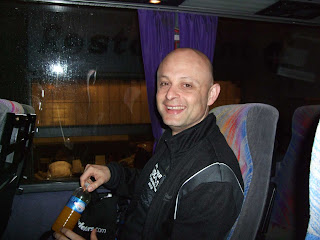
A 4am awakening and a forced breakfast showed that there were extremes in preparation. Some had barely more than summer weight jerseys, whereas I had thrown on everything I had (and was still cold). It wasn’t a good feeling loading the bikes up in the rain, and the Powerbar which ordinarily tastes terrible went down particularly badly on the bus. We were treated to a traffic jam of cars trying to get onto the Autoroute at 5am, packed with bikes of all types and description. There was a massing of cyclist like some sort of dawn break pagan ritual, drawn to a common place by a mysterious primordial force.
Our arrival in Pau with the soft rain would ordinarily have been quite rustic, some would say romantic. All I could think about were the descriptions of battles and the feelings described from the trenches of World War 1. We arrived to a throng of activity with cars and bikes everywhere. Last minute pumping of tyres, adjusting of brakes, a short toilet break in the bushes, and we were off. Down dark streets to the turf club carpark which was the site of the mass start of the etape. Mark and I had drawn start numbers in the 6000’s, and we had a particularly unpleasant wait as we chilled in the corral. Jerard was perhaps luckier to start 3000 riders ahead of us. He was already out of sight amongst a sea of helmets and carbon.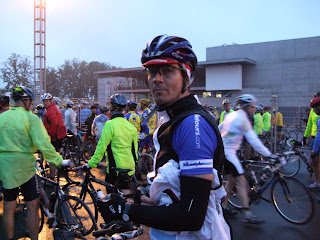
As more riders piled in, the atmosphere was intensifying. Cycle groups would break into French song about ride domination. Old crusty campaigners were mixing it up with newcomers. Rusty steel and aluminium clunkers were amongst ubiquitous carbon, often ridden by gnarled mountain-men with stern faces. We sized up the competition, trying to catch sideways glances of bikes and legs, trying to look cool and nonchalant. There was a hubbub of speech in French, Italian, Pommy, and Irish, all nervous and sometimes boastful. It was impossible to know who would go fast, and who would fail. We all knew one thing though- it was going to be tough. I tried to talk up my confidence. After all, 100km of the race was on the flat, and 30km would be descending – how hard would it be? We shivered mainly from cold, but partly from nerves. All through this it kept on raining.
The Ride
All of a sudden a cheer, and a roar at 0700 – a thousand cyclists were let out of the pen. When those had cleared, another thousand, then another and another were released. Each time the gates opened, a cry rang out, like an ancient army charging into war, as riders streamed past the gates to trigger the electronic timing. It was all too soon our turn, and we edged our way to the front. The mood was electric with a sea of Lycra and pumping legs. The roads were wet and narrow, but all thought of pacing this one was lost as we strove to get to the open road. Through the roads of Pau, and the roundabouts and traffic islands there were bikes everywhere. There was a nervous energy abound, a frenetic pace that was surely too fast. I guess there is that feeling if you are 6000 places behind the leaders, and you know there is an elimination time. Some foolhardy souls were time trialling at this stage, and I managed to catch a lift with some. I had made up many places, a combination of flat fast roads and able helpers (and a natural antipodean tendency to ride on the left).
Disaster struck when 10km out my bidon slipped out of my wet gloves onto the road. There was no way I could complete the ride on just one, so I stopped to retrieve it. It had landed in the worst possible place in the middle of the road with wave after wave of bikes swarming around. Riders, like lemmings, were throwing themselves one after another to their fates. They were scared to break formation and pace, lest they lose advantage. Only cries of “attencion” caused the disorganised streams to split like a mountain steam cascading around a rock. Like that ancient game of “Frogger”, I waited for a break in traffic, anxious as with each moment I was losing time and places. Eventually I secured the bottle and resumed the chase. Flying along, never leading, always following, I clawed back time and places until I was seeing riders numbered in the 6000’s again.
We turned sharply to the left and hit the brakes as there was a significant bottleneck through a village. The road was rough and had sections of cobbles forming traffic chicanes forcing us to walk. Already there had been a major crash with an ambulance stationed on a hill – lights flashing. We streamed past in a low gear, rubbernecking and trying not to be involved in our own pile-up, many jockeying for position. It was a low time slowly riding up the main road of this town in gentle drizzle, reminded of what lay ahead.
Soon, the road began to widen, and trains began to form. The flat profile on the ride description was misleading as the route actually took us over undulating forest. Gradient saw weaker riders (or those who were saving themselves) being passed. The roadside was littered with signs held up by cheering family who showed the same commitment as the riders in the rain. Small children cheered “Allez! Allez!” as their father and his friends clattered past. This was the real thing, both daunting and inspiring all at once. It felt like a real race and we like real racers.
Disaster struck a second time as we progressed to the first of the small descents perhaps an hour or so into the ride. It came after a short hill which caused riders to bunch up across the road. I recognised that as we descended, there would be trouble as the corners had to be tackled. A short sprint across the crest and initial descent saw me lead the small group down the greasy road. The rain continued to be in my eyes as we took a series of gentle curves. Those who ride with me will recognise that my descending style tends to be a little more committed, which perhaps reduces your options as you go down. I had set up a corner at speed, but accounted too late for a rider who had hit the brakes as he too saw the curve tightening. It was too late to do anything but to squeeze the levers tighter and hang on. There was a gentle thud as we bumped each other and my bars which had caught him twisted around. I over corrected and could feel the front wheel losing grip as the slippery tarmac afforded little traction. In slow motion I was down and on my left side, my hands still on the bars and my chin hitting the ground. The bike slid a few more metres, and came to rest in the centre of the road.
My instincts were to get off the road fast, and I was soon scrambling on my grip-less cleats. I watched as perhaps a hundred riders descended toward where I had just been. Cries of “Velo! Velo!” punctuated the racheting of freewheels as miraculously riders were able to swarm either side of the obstruction. A break in the flow allowed me to retrieve my bike. I feared that my ride was over as I inspected it quickly for damage. Apart from a twisted left brake lever, there was not much to see. It was then that I remembered that I had landed on my chin which was feeling ominously numb. Blood steadily dripped onto my bar tape as I walked to a safer spot. There was another rider here– Tim with an American accent – who I asked to have a look. He told me the gash was very deep and that I would need stitches. No more riders were coming down now, and with a shrug of my shoulders I hopped back on the bike, not wanting to be stuck in the middle of nowhere.
I actually felt energized as only a major adrenaline release can make you feel. Soon the road was flat and I was again passing with the assistance of swifter riders. The only annoyance was the continual red drip onto my handlebars and top tube. There was road spray everywhere and I worried about contamination of my wounds. I passed a familiar Ridley on the side of the road: it was Mark who had flatted his rear tyre. A few minutes of fiddling under the watchful eye of a French farmer looking over his front wall had Mark’s back tyre on. I got him to check me out – it didn’t look too bad he said. (He later admitted that in reality he thought the wound was quite deep, but since I looked like I wanted to continue the ride he’d take on an encouraging tone).
Re-invigorated by sugar and the rest we continued the pursuit. I chased with a pace that I had not put on for a while and made pleasing progress. I actually felt optimistic of avoiding the cut-off. With all the delays that had gone on that was a real concern. There was a short climb of 5kms at 5 percent. The stream of riders slowed as we wheezed up the hill. Uncharacteristically I actually kept pace and overtook on the hill (those who ride with me know that hills are not my forte). Again the roads were lined by families and friends who had turned out to cheer us on. I managed to give some a wave of recognition which elicited response of encouragement. I could not help feeling perturbed by the looks children gave me as I pedalled past with blood running down my jersey. Mark soon cruised past, but I was not far behind, and soon we were on the flat and descent again.
The next set of descents were not as technical, and although I had lost a bit of nerve, I knew that I could still progress adequately. Soon the road was flat and excellent progress could be made to the feed station in Lourdes. The pace had pretty much settled to a steady procession and the frenetic pace had the sharp edges knocked off. A short series of corners led us into central Lourdes where the water stop had been set up. My glasses had fogged after coming to a stand still as I made my way past masses to get water and jellied fruit. It was amazingly well organised as volunteers dispensed cans of drink, spooned out energy powder and ham sandwiches with croissants. I refuelled and thought about making a quick getaway when I spied the medical tent.
I thought that I should get a bandage, and get back on the road. I was still feeling quite good at this point and was looking forward to testing myself on some climbs. It was the look that the nurse gave me in the medical tent that told me my race was now over. She motioned me over to a trolley to lie down and fetched t
he doctor. He said that I could leave the bike here as I needed to be transferred to the hospital to get stitched up – they had no facilities to debride the wound in the tent. For a moment I actually thought that I might get away with asking for a bandage and soldiering on, but that would turn me into one of those patients who don’t follow instructions that I myself dislike. With a reluctant and disappointed sigh, I was bundled into a waiting ambulance for transfer with a temporary bandage in place . I tried to cheer myself up by taking a picture of the nurse in the ambulance, who also took one of me.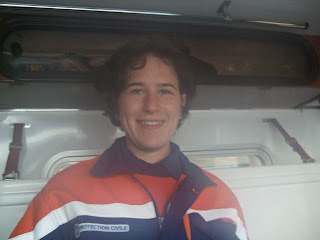
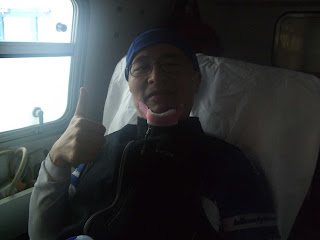
The hospital was quiet for a Sunday morning, but staffing had to cope with guys who had fallen earlier. I saw the tell tale slings of men who had done their collar bones, and a guy who was in a hard collar. It made me feel lucky that I could have actually ridden on after my spill. The ED Doctor was no nonsense but professional, as only someone who was mildly annoyed at having to do a Sunday shift would be. She was not a little intimidated at having to repair an urologist’s face: surely if he was stupid enough to go riding in the rain like a madman, he wouldn’t be too fussy. The drape was placed over my face, and a familiar process of cleaning and local anaesthetic injection had begun. All too often I had been on the other side of the drapes, thinking to myself “what sort of self destructive activity has this guy undertaken?”

Without fanfare, it was all over. An x-ray of my jaw to make sure it wasn’t broken and to inspect my expensive dental work, and I was turfed back on the street. My priority now was to get back to my bike which was a real danger in the rain on cobbled roads in my cleats. It was a distinct possibility that I would end up back in the hospital and in a wheelchair like the pilgrims that turned a disapproving look at my incongruous attire and still bloodstained jersey. Lost in the throng of nuns, priests and tourists, I eventually made my way with the assistance of a map back to the feed station. By this time the packing up was in full swing. All the tables were gone, and so was the mechanical assistance and medical tents. I scarcely recognised the place that had been an hour later packed with bikes, discarded mineral water bottles, and riders using walls as urinals. Panicked that I could not find my bike, and I was overcome by a real sinking feeling that it was not likely now that I’d be charged for overweight luggage on the way home.
The volunteers eating lunch in a large marquis saw me and motioned me over. “Manjare?” they motioned pointing to their mouths. I made cycling motions to indicate my bike was missing. A lady who spoke English came over and got me to sit down for lunch. Although they were in the process of packing away, some potato salad, cheese, ham and bread materialised. They sat me down and gradually I made them aware of my situation. They assured me that everything would be OK, and gave me a glass of red wine. On the bottle was the local cycle hero Hubert Arbes to whom I was introduced. He was responsible for the local organisation of the course and general rides through the Pyrenees. He shook my hand and I did not need a translator to understand their smiles. Hubert is a bit of a legend and had ridden the tour as a pro five times. His participation rides through the Pyrenees attract thousands of riders. Apart from doing all this and running a bike shop, he also manages the local cyclo-sportive chapter and seems to have the immense respect of his proud volunteers.
http://www.pyreneespursuits.com/scheduled_weekend_breaks_2.htm
http://www.la-hubert-arbes.fr.fm/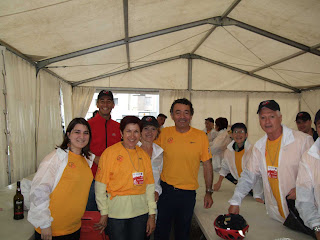
One lady got on the phone to track down my bike: it had been put on the sag wagon and was headed to the finish village. They could provide me with a lift to re-unite me with my bike! I was grateful for their hospitality and took a picture to commemorate their efforts. For me it is these people who live and breathe cycling, and have limitless hospitality who personify the spirit of Lourdes. Their genuine generosity is in contrast to the kitsch commercialism of the hotels and wall to wall cheap souvenir shops. My heart was warmed to these people who had rescued my day. I was soon in a car driven by a lady and her mother, to be reunited with my bike 15 km away at the base of the Hautacam.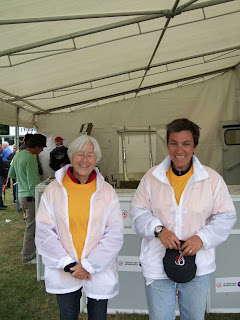
Epilogue
Finally reunited with my bike, I checked it and found that someone had washed the handlebars and bar bag of the blood. It had been carefully packed and was fully serviceable. I had two options – to get a lift with my tour organisers, or to take a short ride back to Lourdes. I could have thrown it in, but the air was clear and the roads were drying. I felt cheated of my chance to climb the peaks and was angry at myself for my mistakes. I had to ride to clear my mind. On the way home I reflected on the day. Why is it we ride? Often in torrid conditions and suffering as a result of exertions, we persist. Some will do it simply for fitness. Others will do so for the moral superiority over the plodding obese masses. Many do so to compete against others for glory or bragging rights. We obsess over the high tech and lightness, fashion, and clamour for kudos at the coffee shop. Are we guilty of being coffee shop poseurs? There is a fine line between being competitive, and being consumed by the need to best others. I think sometimes we are guilty of these things to some extent where riding becomes more of a chore or a task then a pleasure. Today should have been about having a good time on the bike, testing oneself against the course, but it had turned into one where “failure” was an omnipresent threat.
I turned back home, liberated by the feeling that there was nothing more to lose, to enjoy the ride for what it was. The empty road, cool but not cold wind, the splendid scenery, the rolling hills, the sensation of speed and control over oneself and machine, were all there for me to take. I had to learn to be content with riding where there was both success in competition (as surely you would judge the achievement of the other boys), and a different success of the actual process of riding itself. The wind blew through the vents of my helmet, but did not chill (mainly because my x-rays were stuffed down my jersey making a very effective wind breaker like newspapers used by the cyclists of old) making the country feel alive and clean as my legs which had regained their strength and resolve powered to a sprint with no one to see. I had finally started to enjoy my day. 